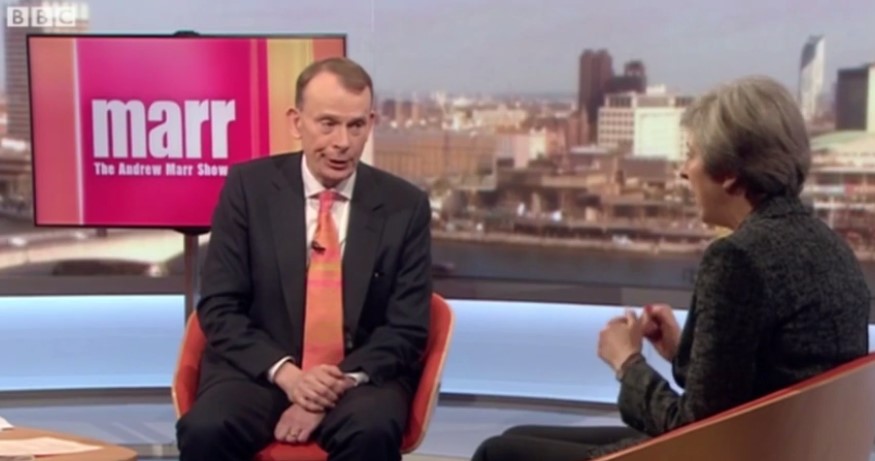The weekend seemed to be the time for dodging questions for politicians up and down the politician spectrum. Theresa May was dodging questions on a nuclear missile test. Jeremy Corbyn was dodging questions on whether he would use whips in the Brexit vote. And Donald Trump’s advisor was dodging questions on the size of the inaugural crowds.
Dodging questions of course is nothing new for politicians. In academia we call it ‘equivocation’ – the art of answering a question tangentially so it appears as if an answer has been given but face is maintained.
Equivocation: ‘people equivocate when posed a question to which all of the possible replies have potentially negative consequences, but where nevertheless a reply is still expected’ (Bavelas et al, 1990)
May – Trident nuclear test
May was interviewed by Andrew Marr on Sunday on a range of issue. One issue was the question of whether Theresa May new about a failed trident submarine test when they had discussed the renewal of the nuclear defence system some months earlier in the House of Commons. According to the Independent newspaper:
Theresa May has dodged four times a question on whether she knew about a Trident nuclear missile malfunction ahead of a Parliamentary debate. (Independent, Jan 2017)
The transcript of the discussion between Andrew Marr (AM) and Theresa May (PM) is given below and subsequently analysed further.
AM: ... when you made that first speech in July in the house of commons about our trident nuclear defence did you know that misfire had occurred PM: well I have absolute faith in our trident missiles when I made that speech in the house of commons what we were talking about was (.) whether or not we should renew (.) our trident whether or not we should have trident missiles an independent nuclear deterrent in the future AM: did you [know that it happened PM: [I think we should I think we should defend our country I think we should play our role in NATO as an in- with an independent nuclear deterrent Jeremy Corbyn thinks differently Jeremy [Corbyn thinks we shouldn’t defend [our country AM: [yeh sure [but this is a very serious= PM: =this is a- AM: this is a very serious incident did you know about [it when you told the house of commons [and PM: and the issue that we were talking about in the house of commons was a very serious issue it was about whether or not we should renew trident whether we should look to the [future AM: [okay PM: and have a replacement trident that’s what we were talking about in the house of commons that’s what the house of commons voted for I believe in defending our country Jeremy Corbyn voted against it he doesn’t want to defend our country with an independent nuclear deterrent (.) AM: prime minister (.) did you know (1.5) PM: there are test that take place all the time er for our regularly for our nuclear deterrents what we were talking about in that [er debate that took place AM: [yeh xx le- let’s okay I’m not gonna get an answer to this
Marr first asks May about whether she knew about the misfire of the test. May does not answer this directly and instead moves on to the House of Commons.
AM: did you know that misfire had occurred PM: well I have absolute faith in our trident missiles when I made that speech in the house of commons what we were talking about
Marr then interrupts and tries again. May again equivocates.
PM: an independent nuclear deterrent in the future AM: did you [know that it happened PM: [I think we should I think we should defend our country
Marr again interrupts when Theresa May starts to talk about Jeremy Corbyn and there is some negotiation of the floor. This is demonstrated by the overlap in the turns and the latching.
PM: Jeremy Corbyn thinks differently Jeremy [Corbyn thinks we shouldn’t defend [our country AM: [yeh sure [but this is a very serious= PM: =this is a- AM: this is a very serious incident did you know about [it when you told the house of commons [and PM: and the issue that we were talking about in the house of commons
Marr makes a final plea with the Prime Minister to answer the question. In this last attempt, Marr wait until May has finished and then asks simply ‘Prime Minister … did you know’. The simplicity of the question catches May out briefly and the 1.5 second pause before she answers is quite telling in an interview that has been conducted at fast pace with hardly any pausing. May however again refuses to answer the question directly.
AM: prime minister (.) did you know (1.5) PM: there are test that take place all the time er for our regularly for our nuclear deterrents
May – women rights
In the same interview, May also dodged the question of whether she would raise the issue of women’s rights when she meets with Donald Trump in the near future.
Analysis on its way…
Corbyn
Corbyn dodged the question of whether he would whip his MPs to vote for the triggering of article 50 in the House of Commons.
Analysis on its way…




Leave a Reply
You must be logged in to post a comment.